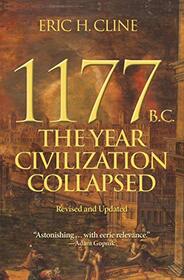Because I know so little about the Near East, I wanted to read this story about ancient nation-states. National Geographic indicates that the Near East and the Middle East are the same territories of the Arabian Peninsula, Cyprus, Egypt, Iraq, Iran, Israel, Jordan, Lebanon, the Palestinian territories, Syria, and Turkey. Afghanistan is often included in this group.
This book details great changes at the end of the Late Bronze Age. The lingua franca was Akkadian. Until recently, the turmoil of this earlier time was laid at the feet of the Sea Peoples. However, we are still not sure who the Sea Peoples were or when they arrived on the scene. With Cline's research, it is clear that there was more afoot that brought civilizations down.
These elevated cultures, including the Egyptians, Hittites, Canaanites, Assyrians, and Babylonians, developed a method of kinship to increase trading and friendship. There was a high level of gift-giving between Egypt, the Near East and Greece. They called each other 'brother' to instill feelings of partnership in trading, even though there might be no familial relationships.
While the leaders were engaged in gift-giving, the common man was busy buying and trading goods. Cline says that we have underestimated the amount of trading and bartering that took place at this early time. According to Cline, the Bible was written down between the 9th and 7th centuries BC.
This is a deeply-researched tome that brought together ancient texts, archaeological evidence, and historical information to show the "perfect storm" that created the conditions for the failure of the known world in 1177 BCE. Cline also compares that world to our own, showing the comparable conditions then and now. This is a masterful work. This is a book that I will read again at a later time. I doubt that I gleaned all there was to learn in one sitting. I also found listening to this work to be less helpful than reading it myself.
This book details great changes at the end of the Late Bronze Age. The lingua franca was Akkadian. Until recently, the turmoil of this earlier time was laid at the feet of the Sea Peoples. However, we are still not sure who the Sea Peoples were or when they arrived on the scene. With Cline's research, it is clear that there was more afoot that brought civilizations down.
These elevated cultures, including the Egyptians, Hittites, Canaanites, Assyrians, and Babylonians, developed a method of kinship to increase trading and friendship. There was a high level of gift-giving between Egypt, the Near East and Greece. They called each other 'brother' to instill feelings of partnership in trading, even though there might be no familial relationships.
While the leaders were engaged in gift-giving, the common man was busy buying and trading goods. Cline says that we have underestimated the amount of trading and bartering that took place at this early time. According to Cline, the Bible was written down between the 9th and 7th centuries BC.
This is a deeply-researched tome that brought together ancient texts, archaeological evidence, and historical information to show the "perfect storm" that created the conditions for the failure of the known world in 1177 BCE. Cline also compares that world to our own, showing the comparable conditions then and now. This is a masterful work. This is a book that I will read again at a later time. I doubt that I gleaned all there was to learn in one sitting. I also found listening to this work to be less helpful than reading it myself.




